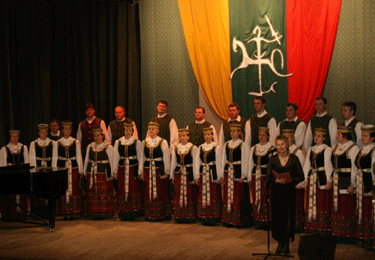

In their words, the uncertainty is fueled by the parliamentary initiative to equate “Lithuanian nationalism” to a totalitarian regime.
“We are observing one thing – the indeed increasingly radical beliefs in Warsaw, in the ranks of the current ruling party, we truly do not know what to expect,” Algirdas Vaicekauskas, the leader of the Sejny-based Society of Poland’s Lithuanians, told BNS.
“We find it very strange that the amendments include a concept of ‘Lithuanian nationalism‘. I don’t know that the Senate members have in mind in the initiative – are these Lithuanian symbols, is it (the Lithuanian national emblem) Vytis, is it the tricolor (Lithuanian national flag) or monuments? We don’t know whether the monument to Antanas Baranauskas in Sejny would be viewed as Lithuanian nationalism, which the legal amendments will ban,” he added.
“We hear signals about possible review of content of textbooks used in schools, about some controllers coming and checking our library. I understand the need to ban content that promotes nationalism, communism, fascism and other totalitarian regimes. This I can understand. But I cannot imagine how we wouldn’t be able to teach the Lithuanian history (by the Lithuanian curriculum) in Lithuanian-language schools,” said Vaicekauskas.
Speaking about the Senate’s initiative, which was excluded from the agenda on Thursday, he expressed hope that “common sense would prevail.”
Terėsė Uzdilaitė, the leader of the Suwalki branch of the Lithuanian community in Poland, also said other national minorities sensed the heightened political tensions over statements of some ruling politicians.
“This sounds very threatening. We raise no political issues (…). Everyone’s afraid of this administration, there will be extremities, we sense it. Other communities are also discussing what they should do. The fearful times of the Solidarity are coming back. There were many things back then, including intimidation,” she emphasized.
Uzdilaitė says that Lithuanians are in good contact with local Polish communities in Punsk, Sejny and Suwalki, with no tensions felt there.
The amendments suggesting to equate “Lithuanian nationalism” to a totalitarian regime was excluded from the Thursday’s agenda of the Polish parliament. Lithuania’s Foreign Minister Linas Linkevičius dismissed the initiative as a misunderstanding, which was solved, as Lithuania had expected.
While Prime Minister Gintautas Paluckas does not take issue with the statements made by the…
Lithuanian economists are surprised to see our country's economic growth: the Estonian economy has been…
"The fate of Nemuno Aušra (Dawn of Nemunas) in the coalition has been decided; they…
Airvolve, a Lithuanian dual-purpose aeronautics company, has successfully completed its first round of testing and…
The world is becoming smaller, more intertwined, and increasingly fragmented, with many of the previous…
In recent years, Vilnius, the vibrant capital of Lithuania, has experienced a culinary renaissance. While…